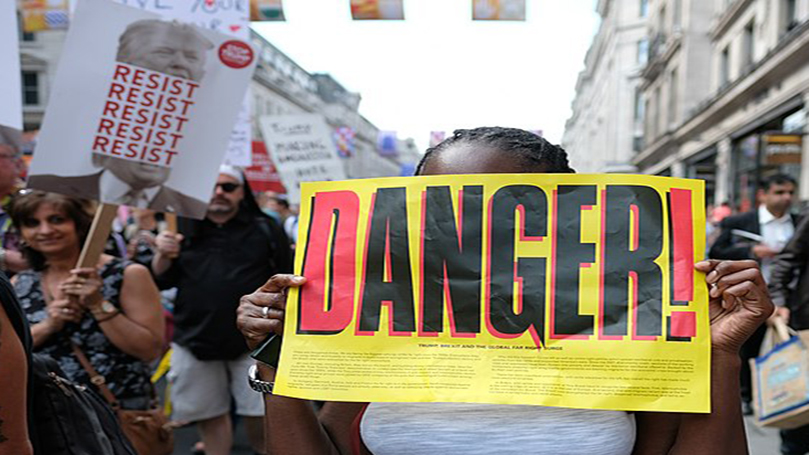
“Mr. President, is this still a democracy?”
A reporter asked this question while Trump stood in front of St. John’s Episcopal Church and fiddled with a bible in his hands, unsure which way was up. The question was posed after the National Guard and police in riot gear deployed tear gas, rubber bullets, and stun grenades to sweep away protesters before the 7:00 p.m. curfew so that Trump could march from the White House to the church for a photo-op. The question came after Trump announced earlier in the Rose Garden that he intends to send federal troops to states whose governors refuse to quell dissent—all while the Drug Enforcement Agency, FBI, and other agencies are spying and collecting intelligence on protesters throughout the country.
A good question, indeed.
In a video conference with state governors, Trump, using dictatorial language, told the governors that if they didn’t stop the protests, he would “solve the problem for them.” “You’ve got to arrest people, you have to track people, you have to put them in jail for 10 years and you’ll never see this stuff again,” he said. Urging the governors to “dominate” the protesters, he said, “If you don’t dominate you get run over like a bunch of jerks.” Secretary of Defense Mark Esper, in the same meeting, referred to protest sites as a “battlespace” that needs to be dominated.
Trump declared that he will designate antifa, or “anti-fascist,” a “terrorist organization.” He doesn’t have the legal authority to do this, but calling antifa “terrorist” endangers not only anti-fascist activists but all progressive and left organizations. To paraphrase James Baldwin in his letter to Angela Davis, if they take you in the morning, they will be coming for us at noon. When activists are declared terrorists, their civil rights—and the ability to struggle for those rights—are threatened.
This fascist-tinged language should frighten and alarm all of us. The notion of federal troops quashing dissent should scare us even more.
The 1807 Insurrection Act gives the president broad power to send troops to states. Although under the Posse Comitatus Act of 1978 the military is not allowed to enforce law in the U.S. unless Congress authorizes it, the Insurrection Act allows for an exception. Traditionally, a line has been drawn between the use of troops for foreign wars and for enforcing law within the U.S. and its territories. However, this has not been the reality. Federal troops or federalized National Guard units have been deployed several times: most recently in 1992 in Los Angeles while people protested the police beating of Rodney King, in 1962 when John F. Kennedy sent troops to Alabama to enforce desegregation, in 1967 when Lyndon B. Johnson sent troops to Detroit and other cities to quash the rebellions, and in 2005 when George W. Bush sent troops to New Orleans to assist with relief efforts in the aftermath of Hurricane Katrina.
The deployment of federal troops has been not without oppression. But Trump’s threat to send troops to states feels different. Kristen Clarke, director of the Lawyers’ Committee for Civil Rights under Law, said on Democracy Now! that Trump “single-handedly seeks to deploy the military to states . . . over the objections of state officials and with the sole and singular purpose of silencing Americans. In many ways this is death of democracy.” Oregon senator Ron Wyden tweeted, “The fascist speech Donald Trump just delivered verged on a declaration of war against American citizens. I fear for our country tonight and will not stop defending America against Trump’s assault.”
Sending in troops would mark a deepening of the fascist danger and the transition to a new form of rule.
If the U.S. is a “battlespace,” then the protesters are the enemy. Trump’s threat to send in the troops is accompanied by a fascist message: You are the enemy. You have no right to free speech. You must be disciplined.
Trump is declaring war on the people—or, more accurately, black, brown, and Asian people and their supporters. For his view of today’s protesters contrasts wildly with his views of the right-wingers challenging governors’ “stay home” orders or the Charlottesville “Unite the Right” protesters, whom he characterized as “very fine people,” never mind that one of them murdered a counter-protester with his car.
Trump, already impeached, now must be censored by Congress. Resolutions should be passed by every legislative body in the country. Trade unions and other democratic organizations might consider what actions can be taken.
But more than words are needed. Support the Movement for Black Lives. Continue to protest, join the uprising, and keep the pressure on! Demand community control of the police, and while we’re at it, let’s defund them!
“Mr. President, is this still a democracy?” This question has already been answered by the protesters who are exercising their rights in the streets. The November 3 election will provide another opportunity to answer the question. While we continue to protest on behalf of George Floyd, let’s organize a massive voter turnout on November 3, end the Trump regime, and continue the struggle for an end to police brutality, full equality for all, and democracy.
Image: Alisdare Hickson, Creative Commons (BY-SA 2.0).


 Join Now
Join Now